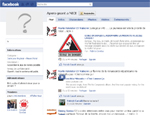“But this type of ‘gathering,’ by definition, does not have organizers… but at most initiators.
And, in terms of security, could a potential ban be a deterrent or an encouragement to participate, knowing the pleasure many people derive from doing what is forbidden? A story that ultimately isn’t one, and that sparked debate without a really valid reason, ending before it even began. A real ‘non-issue,’ really!
Here are the facts to which we allow ourselves to add our commentary.
First of all, we should not hide behind words: Wherever these events have taken place, they have led to disruptions that caused public order problems, sometimes with significant material damage, and even physical consequences for certain individuals.
From a cultural standpoint, portraying these gatherings as acts of conviviality and socialization requires a boundless imagination. Indeed, if a society needs such trials to exist, one must recognize that the situation is quite serious, and it’s certainly not a few bottles of beer or other alcoholic drinks that can improve the state of human and social relations among the inhabitants of a city. Because if that were the case, we might as well turn to neuropsychiatry!!!
To those who are in favor, in the name of individual and collective freedom, we offer a simple reading recommendation of the English liberal thinker, John Stuart Mill, the first to intellectually question the relationships and limits between individuals and their freedom of thought and action. He concludes that ‘the freedom of each must be absolute with the only limitation being respect for the freedom of others.’ This principle, which seems elementary, is unfortunately not practiced in individual daily life and even less so in the core application in the major axes of social life.
We are not always in favor of the sometimes ‘forceful’ security policy of the Mayor of Nice, Christian Estrosi, whose actions we find more about appearances and announcements rather than effectiveness.
But in this instance, we fully share his approach. And let’s be honest: why bestow any nobility on what Benoît Kandel, 1st deputy, so rightly defined as “a massive public intoxication”?
In conclusion, it’s very appropriate that the Giant Niçoise Apéro remains in the words of a few ephemeral and anonymous organizers and that Nice resumes its life by facing its ‘real’ problems… without drowning them in alcohol!”


